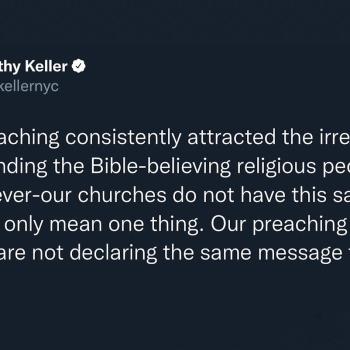 Attribution: Photo Altered; The Original Photo by “slagheap”; CC 2.0
Attribution: Photo Altered; The Original Photo by “slagheap”; CC 2.0
We tend to drift along happy and content and then when something terrible happens we start wondering where God is. If God truly is omnipotent and benevolent then why does this stuff continue happen? Why doesn’t He stop these horrible things? It’s certainly not a question of power or ability. I think scripture and other events in history make this clear. So, why then, if God loves us, does He let these things happen? This is complex question with an even more complex answer. And, even that answer is wrapped in mystery.
Over the past several weeks my news feed, and I’m sure yours as well, has been flooded with some of the most horrible stuff I have ever seen. There is a terrorist group in Iraq called ISIS that is systematically locating and killing Christians. The “ن” symbol is being painted on homes to identify where Christians live by the ISIS terrorists. There are all kinds of rumors of how this has taken place. But, honestly, I couldn’t get past most of the headlines. I have started to read a dozen of these articles and have to stop a few sentences in because the content was too hard for me to read. My heart and prayers are with those suffering in these, or similar persecution, situations around the world.
I want to add that sometimes when talking about a theological issue there can be a sense of detachment and emotionlessness. I truly hope that is not the case here. What’s happening the Middle Rast, in Africa, and even in your home town is terrible. My heart breaks when I read or hear of what people are having to endure. Its easy to read a wordy blog like this and get an “ivory tower” mentality. But that is not the intent. The intent here is to provide direction for understanding the horrors of our world and, in turn, hope. This blog is not meant to provide you with a clear reason why something horrible happened to you. But rather to serve a compass and get us in a direction where God can bring peace, healing, and, one day, an answer.
Laying A Proper Foundation
In the Fall of 2005 I was a college student at Dallas Baptist University. I was a history major trying to build a solid historical foundation in preparation for seminary. One morning that fall I attended a symposium. The subject of the meeting was “Arminianism and Calvinism: Common Ground and Divergent Perspectives”. The presenter was Dr. Roger Olson. Dr. Olsen is the professor of theology and ethics at Truett Theological Seminary. He is well known for being an Arminian theologian and speaking out again Calvinism. Many of his books and articles are on this subject matter.
Something happened in this meeting that have never forgotten. The meeting started with Dr. Olson explaining what each side believes and, honestly, he did a better job explaining Calvinism than most Calvinist I know. He nailed it. He then went on to talk about the problems of Calvinism, as he sees it. As I recall, he stated his biggest problem with Calvinism is how it deals with evil and the determinism. In short, If God predestines people and everything, then He must of ordained sin and evil to exist.
In the Q&A session someone asked, “Dr. Olsen, how do you feel about the explanation that John Piper provides for this problem?” Dr. Olsen thought for a moment and then answered with a response I will never forget. He said “If you read the bible like John Piper, or Jonathan Edwards whom much of this theology is based, then the entire bible makes perfect sense from cover to cover.” I was stunned by what he said. He went on to explain that he refuses to hold to this position because it seems out of character with his understanding of God in the bible a loving God could not do this. For him the difficult verses in the bible were simply a mystery to be revealed in heaven.
I left that room with a clear understanding of how having weak theological foundation forces you to make allowances for tough scriptures and ideas. Dr. Olsen, while admitting the doctrine was logical and there was seeming scriptural support, just couldn’t go there. His foundation wasn’t prepared to hold weight of such a heavy topic, like the problem of evil.
So, like Edwards and Piper, we must approach the subject with a strong foundation. A foundation that is rooted on the supremacy and sovereignty of God. We need a footing that reminds us that God is glorious and that all things work towards that end: God being glorified. We must also remember that God is huge. We can’t make God in our image. We can’t assume He thinks like we think or acts like we act. He is great and perfectly wise. Form our vantage point we can only see a microscopic fragment of the beautiful picture He is painting. We must remember that He is also perfectly loving and perfectly just. To quote Steven Curtis Chapman, “God is God and I am not”
Evil is not greater than God

With this foundation in mind, lets start at the top. Our adversary, Satan, is crafty. He is the father of lies and will stop at nothing to distort the truth. But he is not sovereign. When I was younger I ascribed way more power to Satan than he was due. Don’t get me wrong – he is powerful. But, he is not more powerful than God. Whatever cosmic struggle there may have been was ended on the cross. Jesus defeated evil. The war is over and Satan is scrapping to do what he can before all the Brothers and Sisters in Christ are found and brought home. Martin Luther, the German reformer, described Satan like a dog on a leash. He can run but its not long before God yanks him back.
We see in the bible that God is sovereign of matters of life and death. Most of us have heard Job 1:21, “And he said, “Naked I came from my mother’s womb, and naked shall I return. The Lord gave, and the Lord has taken away; blessed be the name of the Lord. But, take a special note of the very next verse, “In all this Job did not sin or charge God with wrong.”Also consider, Duet 32:29,”There is no god besides Me; It is I who put to death and give life. I have wounded and it is I who heal, And there is no one who can deliver from My hand.” God is the author and sustainer of life.
It doesn’t take a lot of work to find in scripture that God also has power over threats towards human life, like natural disasters. Ever heard of a guy named Noah? We like to think of the flood as it was presented to us as children, with smiling white people, beards, happy animals, and a dove. But in reality, God killed everyone on the planet except for 1 family that I’m sure was terribly stressed out. The flood is a tough passage in scripture and I can empathize why people struggle with it. Stories in the bible, like the great flood, can make us ponder God and His motives.
We are not alone when it comes to uncertainty towards God’s actions. Consider Job for a moment. Job lost his children, property, wealth, good name, and even his health. He suffered greatly and in chapter 37 he questioned God’s actions. Read careful God’s response to Job in chapter 38:
1 Then the Lord answered Job out of the whirlwind and said:
2 “Who is this that darkens counsel by words without knowledge?
3 Dress for action like a man;
I will question you, and you make it known to me.
4 “Where were you when I laid the foundation of the earth?
Tell me, if you have understanding.
5 Who determined its measurements—surely you know!
Or who stretched the line upon it?
6 On what were its bases sunk,
or who laid its cornerstone,
7 when the morning stars sang together
and all the sons of God shouted for joy?
8 “Or who shut in the sea with doors
when it burst out from the womb,
9 when I made clouds its garment
and thick darkness its swaddling band,
10 and prescribed limits for it
and set bars and doors,
11 and said, ‘Thus far shall you come, and no farther,
and here shall your proud waves be stayed’?
The content above may come across as harsh to some and that’s where you really have to stretch your understanding of God and scripture. Remember our foundation mentioned above. I say this because even though it sounds harsh, James tell us its meant to be compassionate. James 5:10-11 reads, “As an example of suffering and patience, brothers, take the prophets who spoke in the name of the Lord. Behold, we consider those blessed who remained steadfast. You have heard of the steadfastness of Job, and you have seen the purpose of the Lord, how the Lord is compassionate and merciful.”
God has an amazing way of making trials, that seem terrible, all work together for the good of those called according to His purpose (Romans 8:28). Even as early as the book of Genesis we see God explaining that He is never not in control, and while you may not see His plan clearly – He means it for good. Consider Joseph’s response to his brothers who basically sold him into slavery, “As for you, you meant evil against me, but God meant it for good,”
Is God the Author of sin?
This is where things start to get difficult and where Roger Olsen gets really hung up. If its God’s will for bad things to happen, then isn’t he responsible for it? Let’s go back to Jonathan Edwards. He explanation is compelling, “If by ‘the author of sin,’ be meant the sinner, the agent, or the actor of sin, or the doer of a wicked thing . . . . it would be a reproach and blasphemy, to suppose God to be the author of sin. In this sense, I utterly deny God to be the author of sin.” He adds that an allowance for sin exist is not the same thing as sinning. God has established reality in such as way that sin happens by God’s permissions but not by his “positive agency”.
Edwards gives us a great analogy to help us understand. The sun, by its nature, brings about light and warmth, but it also brings about dark and cold by dropping below the horizon. The sun is not the direct cause of cold and dark rather a result of the lack thereof. In other words, “sin is not the fruit of any positive agency or influence of the most High, but on the contrary, arises from the withholding of his action and energy…”
This illustration also helps us see that two seemingly contrasting things (light and dark) can exist together for a greater purpose. That framework can help us begin to make sense of all kinds of confusing things in scripture. The fact that God can Harden Pharaoh’s heart but commands him to let his people go. Or that that he forbids murder but tells Abraham to murder his son. And, the fact that He demands all men everywhere to repent and be saved but only effectually calls some. This is a distinguishing ability of God. It seems so illogical, yet its there.
God is not the author of sin – that’s blasphemy. But He allows it to exist for a greater purpose. We can’t always recognize the greater purpose. But we can rest assured that God loves to make beautiful things out of tragedies. I mean, that’s our story right?
A Difficult Truth
With all the above in mind, its time to ask the million dollar question: If God is sovereign why does he allow terrible things to happen? There is certainly some mystery involved here. As we determined above we can’t understand the methods and reasoning of God. Although, we can ascertain some meaning to the mystery. Our foundation tells us that the end and meaning of all things is God’s glory. So then, how is God glorified with the existence of evil?
This is where things really get difficult. Jonathan Edward’s provides some insight into these questions. Reread this if you have to – its worth it.
Jonathan Edwards
“It is a proper and excellent thing for infinite glory to shine forth; and for the same reason, it is proper that the shining forth of God’s glory should be complete; that is, that all parts of his glory should shine forth, that every beauty should be proportionably effulgent, that the beholder may have a proper notion of God. It is not proper that one glory should be exceedingly manifested, and another not at all. . . .
Thus it is necessary, that God’s awful majesty, his authority and dreadful greatness, justice, and holiness, should be manifested. But this could not be, unless sin and punishment had been decreed; so that the shining forth of God’s glory would be very imperfect, both because these parts of divine glory would not shine forth as the others do, and also the glory of his goodness, love, and holiness would be faint without them; nay, they could scarcely shine forth at all.
If it were not right that God should decree and permit and punish sin, there could be no manifestation of God’s holiness in hatred of sin, or in showing any preference, in his providence, of godliness before it. There would be no manifestation of God’s grace or true goodness, if there was no sin to be pardoned, no misery to be saved from. How much happiness soever he bestowed, his goodness would not be so much prized and admired. . .
So evil is necessary, in order to the highest happiness of the creature, and the completeness of that communication of God, for which he made the world; because the creature’s happiness consists in the knowledge of God, and the sense of his love. And if the knowledge of him be imperfect, the happiness of the creature must be proportionably imperfect.” (The Works of Jonathan Edwards, Vol 2)
God is the most central beautiful important being that ever was and ever will be. He is so glorious and majestic that, out of love and compassion, He desires to communicate all of Himself to us. Our happiness and joy is wholly rooted in knowledge of God. It is easy to see and appreciate the love of God and His “happier” attributes. But that is not all that God is. He is also just and wrathful. He has an appropriate righteous vengeance. So much so, He will one day judge the world for the sins its committed. Those realities exist and that is the God that saves us. And, just like Gods love and compassion deserve to be gloried, so also does his wrath, justice, and “dreadful greatness”. It is as Edwards says a “completeness of that communication of God”
This is a tough pill to swallow. But Edwards, like many others in the Reformed camp, conclude that evil exists, ultimately, for God’s glory and in turn our joy. It’s strange, isn’t it? But, when I think about this I can’t help but be remember Romans 8:28, “And we know that for those who love God all things work together for good, for those who are called according to his purpose“. The whole story is about God.
Rest in God’s Sovereignty and Justice
Brothers and Sister’s in Christ, know that God loves you and the pain you are enduring right now has a purpose. It has not caught God off guard. He is not unwilling to help, although sometimes our prayers are seemingly answered with silence. He loves you so much that, for reasons no one can know, he is allowing this hurt to go on. Rest in the fact that God truly is sovereign. The Lord of time and dominion has chosen to love you and shower you with everything you need to reach your ending joy, glorification. Rest in the work of Jesus. Take hold of it, meditate it, relax, and breathe out.
Do this and also remember that God is just and will render a punishment for those who deserve it. The unspeakable things being done by the ISIS will not be forgotten. God is vengeful and the wrath of hell will be unleashed on those committed such terrible crimes. God is at work at even now to bring these things to pass. All things will be made right, rest in this.
It took some time for me to wrap my head around these ideas and concepts. I spend many months praying through this and trying to reconcile preconceived notions of of how I thought God to be. Through this, I realized that many of ideas of God were exactly that, preconceived notions. They were ideas of how God thought and operated based my experience, but, not really on how the bible portrays Him. I slowly realized that the view held by men like Jonathan Edwards really makes God seem like God. Meaning, God no longer looks like me but looks like the Lord of time and dominion.
I think what astounds me in all of this is that such a huge God chose to love me, redeem me, and make me His own. He did this while, I too, was deserving of punishment. Perhaps, we should not be so focused on a question like, “Why does God allow evil to exist?” as much as we should we be asking, “How could God save me despite all of my wickedness?”













